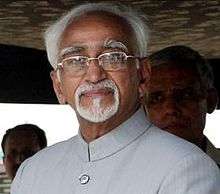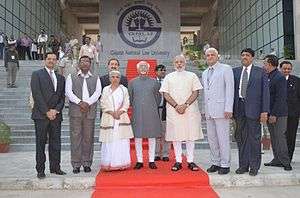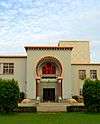Mohammad Hamid Ansari
| Mohammad Hamid Ansari | |
|---|---|
|
मोहम्मद हामिद अंसारी মহম্মদ হামিদ আনসারী | |
 | |
| 14th Vice President of India | |
|
Assumed office 11 August 2007 | |
| President |
Pratibha Patil Pranab Mukherjee |
| Prime Minister |
Manmohan Singh Narendra Modi |
| Preceded by | Bhairon Singh Shekhawat |
| Personal details | |
| Born |
1 April 1937 Calcutta, Bengal Presidency, British India (now Kolkata, West Bengal, India) |
| Nationality | Indian |
| Political party | Independent |
| Spouse(s) | Salma Ansari |
| Alma mater |
University of Calcutta Aligarh Muslim University St. Edward's School, Shimla |
| Religion | Islam |
Mohammad Hamid Ansari (![]() pronunciation ) (born 1 April 1937) is the 12th and current Vice President of India, in office since 2007. Ansari is the only person to get re-elected for the post of Vice President of India after Dr. Radhakrishnan.[1] He also presently serves as President of the Indian Institute of Public Administration and Chancellor of Panjab University, Chandigarh.
pronunciation ) (born 1 April 1937) is the 12th and current Vice President of India, in office since 2007. Ansari is the only person to get re-elected for the post of Vice President of India after Dr. Radhakrishnan.[1] He also presently serves as President of the Indian Institute of Public Administration and Chancellor of Panjab University, Chandigarh.
Ansari worked as an ambassador and served as Vice-Chancellor of the Aligarh Muslim University from 2000 to 2002.[2] Later he was Chairman of the National Commission for Minorities[2] from 2006 to 2007. He was elected as Vice President of India on 10 August 2007 and took office on 11 August 2007. He was re-elected on 7 August 2012 and was sworn-in by Pranab Mukherjee, the President of India. The oath taking ceremony was conducted at Rashtrapati Bhavan on 11 August 2012.[3]
Early life and career
Hamid Ansari was born in Calcutta (now Kolkata), West Bengal, India on 1 April 1937 though his family belongs to Ghazipur in Uttar Pradesh. He is the grand nephew of former Congress President Mukhtar Ahmad Ansari, a leader of the Indian independence movement. Ansari studied at St. Edward's School, Shimla, the St. Xavier's College of the University of Calcutta and Aligarh Muslim University.
He started his career as Officer in the Indian Foreign Service in 1961. He was Permanent Representative of India to the United Nations, Indian High Commissioner to Australia and Ambassador to the United Arab Emirates, Afghanistan, Iran and Saudi Arabia. He was awarded the Padma Shree in 1984.[4] He was also Professor & Vice-Chancellor of the Aligarh Muslim University from May 2000 to March 2002. He is known for his role in ensuring compensation to the victims of the Gujarat riots and pushing for a complete re-look into the relief and rehabilitation for riot victims since 1984.[5]
Ansari became the chairman of India's National Commission for Minorities (NCM) on 6 March 2006.[6] In June 2007, Ansari, in his capacity as NCM chairman, upheld the decision of St. Stephens College to earmark a small percentage of seats for Dalit Christians.[7] He resigned as NCM chairman soon after his nomination for the post of India's Vice President.
Vice-President

On 20 July 2007, Ansari was named by the UPA-Left, the ruling coalition in India, as its candidate for the post of Vice President for the upcoming election. When asked, Ansari said he felt "humbled" over the UPA-Left decision naming him as their candidate. "I am humbled by the confidence reposed in me". Ansari refused to say more when asked about his prospects in the August 2007 vice Presidential election.[8] Ansari secured 455 votes, and won the election by a margin of 233 votes against his nearest rival Najma Heptullah.
The NDA nominated Jaswant Singh, former Finance, External Affairs and Defence minister as well as former Leader of Opposition.[9] The NDA cited Ansari's conduct in the Rajya Sabha during the The Lokpal Bill, 2011 debate when he had abruptly adjourned the House sine die.[10] Hamid Ansari was re-elected as Vice President for the second term on 7 August 2012, defeating the NDA's nominee Jaswant Singh by a margin of 252 votes.[11]
Views and quotes
Ansari is a West Asia scholar and has written on the Palestinian issue and taken positions inconvenient to the Indian official line on Iraq and Iran. He questioned India’s vote in the International Atomic Energy Agency on Iran’s nuclear programme where India voted against Iran. He said that though the Indian Government claimed to have acted on "its own judgement," this was not borne out by facts.[12] He was the chairman of a working group on "Confidence building measures across segments of society in the State," established by the Second round Table Conference of the Prime Minister on Jammu and Kashmir in 2006. The report of the working group was adopted by the Third round Table in April 2007. Among other things, the report advocates recognizing the right of Kashmiri Pandits to return to "places of their original residence". This right, it argued, should be recognized without any ambiguity and made a part of state policy.[12]
Ansari quoted, "The language used by the Pope sounds like that of his 12th-Century counterpart who ordered the crusades... It surprises me because the Vatican has a very comprehensive relationship with the Muslim world." – 15 September 2006, as Chairman of the Minorities Commission of India, on the Pope Benedict XVI Islam controversy.[13] "No citizen is apolitical; as a citizen, by definition, has to take interest in public affairs.” – 10 August 2007, after being elected Vice-President, on being asked whether he is apolitical.[14][15] "There is no shame in acknowledging the faults and the lacunae that exist in the policies and institutions pertaining to Human Rights." -26 September 2013, addressing the First Convocation of Central University of Bihar.[16]
See also
Notes
- ↑ "Mohammad Hamid Ansari Biography - Vice President of India". Britannica.com. Retrieved 21 September 2015.
- 1 2 "Ansari almost missed V-C post in AMU". Hindustan Times. Retrieved 8 May 2012.
- ↑ Business Standard (11 August 2012). "Hamid Ansari sworn-in as Vice President for second term". Business Standard. Retrieved 20 August 2012.
- ↑ "Hamid Ansari is UPA-Left nominee for VP polls". zeenews.com.
- ↑ "Hamid Ansari is UPA-Left choice". dailypioneer.com.
- ↑ "NCM website – current commission".
- ↑ "St Stephens reservation row". newspostindia.com.
- ↑ "Ansari named UPA-Left candidate for Vice President Poll". ibnlive.com.
- ↑ "VP Poll: Jaswant Singh Vs Hamid Ansari". Outlook India. 16 July 2012. Retrieved 7 August 2012.
- ↑ Andrew MacAskill and Bibhudatta Pradhan (30 December 2011). "Singh Caps 'Annus Horribilis' With Anti-Graft Law Stymied by Upper House". Bloomberg. Retrieved 3 June 2012.
- ↑ "Hamid Ansari retained seat as Vice President". 7 August 2012.
- 1 2 "Hamid Ansari: versatile scholar, statesman". The Hindu.
- ↑ "In quotes: Muslim reaction to Pope". BBC News. Retrieved 13 August 2007.
- ↑ "Anticipation, trepidation, says Ansari". The Hindu. Retrieved 13 August 2007.
- ↑ "Hamid Ansari defeats Jaswant Singh, re-elected as the Vice President". bengalnewz.com. Retrieved 7 August 2012.
- ↑ "Full Text of Vice President Hamid Ansari's Speech at Convocation of Central University of Bihar". Retrieved 26 September 2013.
External links
| Wikimedia Commons has media related to Mohammad Hamid Ansari. |
- Profile at Indian Government website
- Iran Today: Twenty – five Years after the Islamic Revolution (Rupa, New Delhi,2005) (ISBN 81-291-0774-0)
- Hamid Ansari: versatile scholar, statesman
- Goof up leaves Ansari fuming
| Academic offices | ||
|---|---|---|
| Preceded by Mahmoodur Rahman |
Vice-Chancellor of AMU 2000-2002 |
Succeeded by Naseem Ahmad |
| Political offices | ||
| Preceded by Bhairon Singh Shekhawat |
Vice President of India 2007–present |
Incumbent |
